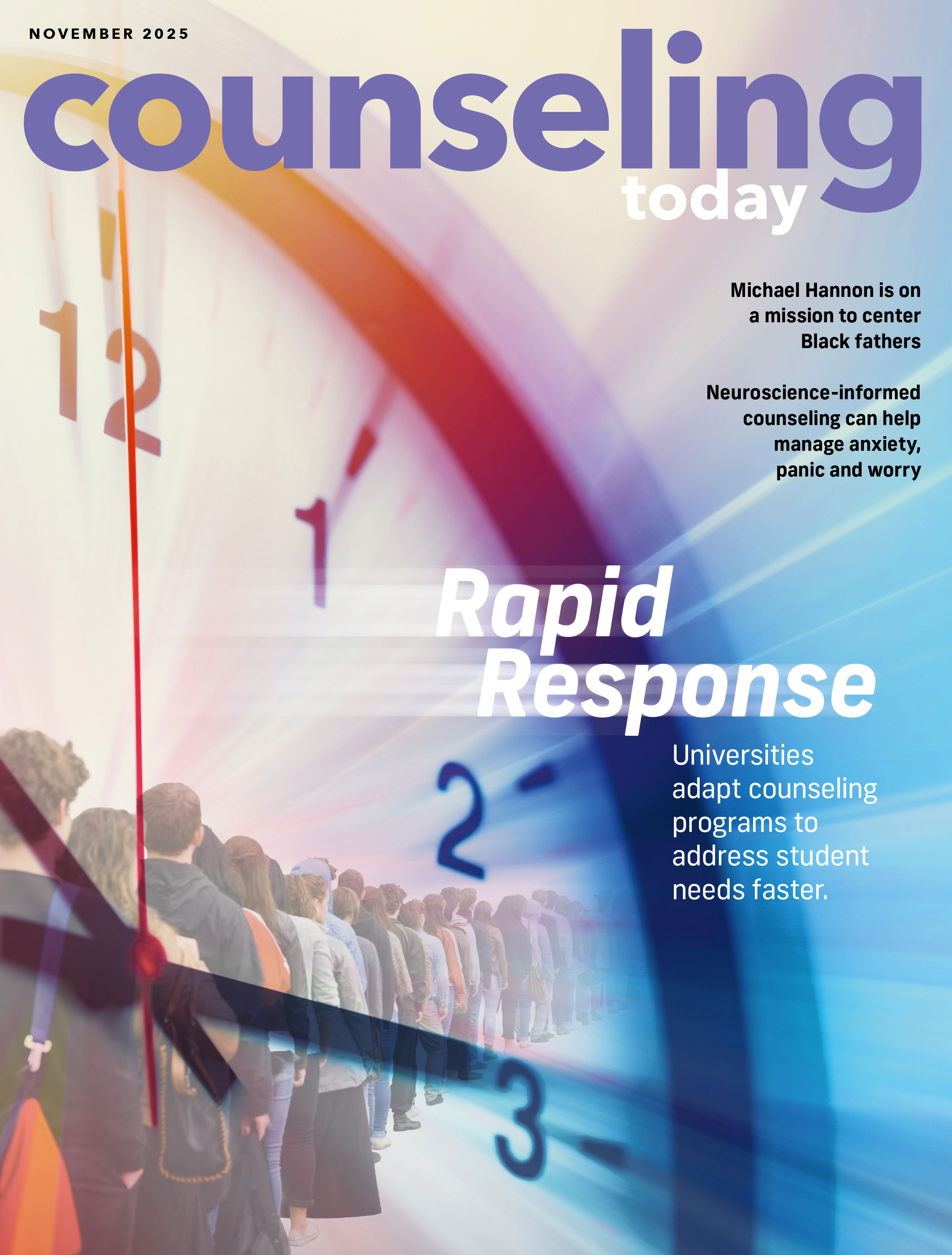Explore Counseling Today Articles
-
 Building rapport with clients experiencing psychosisApril 2023 |By Tina C. Lott
Building rapport with clients experiencing psychosisApril 2023 |By Tina C. LottStigma and misunderstanding about clients with severe mental illnesses can prevent some counselors from taking the necessary steps to build a strong therapeutic relationship.
-
 Fast-food frenzy: Treating emotional eatingApril 2023 |By Scott Gleeson
Fast-food frenzy: Treating emotional eatingApril 2023 |By Scott GleesonEmotional eating may be one of the most disguised forms of escapism clients turn to when dealing with stress or trauma.
-
 Recognizing burnout and compassion fatigue among counselorsApril 2023 |By Madhuri Govindu
Recognizing burnout and compassion fatigue among counselorsApril 2023 |By Madhuri GovinduCounselors have a responsibility to take care of their own mental health before they can help others with their well-being.
-
 Mental health apps as therapeutic toolsApril 2023 |By Lisa R. Rhodes
Mental health apps as therapeutic toolsApril 2023 |By Lisa R. RhodesUsing mental health apps as a supplement to counseling may help clients to foster their own healing.
-
 The impact of telebehavioral health on clinical practiceApril 2023 |By Lisa R. Rhodes
The impact of telebehavioral health on clinical practiceApril 2023 |By Lisa R. RhodesAs telebehavioral health continues to reshape the profession, counselors are adapting the clinical skills they use for in-person therapy to better fit an online environment.
-
 Is Medicaid properly serving youth in foster care?March 2023 |By Is Medicaid properly serving youth in foster care?
Is Medicaid properly serving youth in foster care?March 2023 |By Is Medicaid properly serving youth in foster care?Chase Chick, co-founder of Pursuit of Happiness in Dallas, spoke with Counseling Today about Medicaid’s deficiencies in serving counseling agencies that work with youth in foster care and the steps his practice is taking to reform
-
 The power of counselor advocacyMarch 2023 |By Brian D. Banks
The power of counselor advocacyMarch 2023 |By Brian D. BanksWe are three months into the calendar year 2023, and counselors are beginning to realize how much power they hold in their state legislature and the federal government.
-
 Why, when and how to talk with grieving clients about sexMarch 2023 |By Kailey Bradley and Victoria Kress
Why, when and how to talk with grieving clients about sexMarch 2023 |By Kailey Bradley and Victoria KressGrief is an experience that everyone navigates at different points in their lives. For the past three years, the COVID-19 pandemic has impacted peoples’ lives in myriad ways and left many experiencing significant grief.
-
 Is mindfulness a cure-all approach?March 2023 |By Samantha Cooper
Is mindfulness a cure-all approach?March 2023 |By Samantha CooperMindfulness is often seen as a cure-all approach, but as with other clinical approaches, counselors should carefully consider when and how they integrate this practice into sessions.
-
 The maternal mental health of Black womenMarch 2023 |By Lisa R. Rhodes
The maternal mental health of Black womenMarch 2023 |By Lisa R. RhodesBecause Black women in the United States face an alarmingly higher rate of maternal mortality and mental health conditions, counselors should be prepared to help clients manage their mental health while also advocating for quality care from health pr
Search CT Articles
Filter CT Articles
Current Issue
Sign Up for Updates
Keep up to date on the latest in counseling practice. Sign up to receive email updates from Counseling Today.


